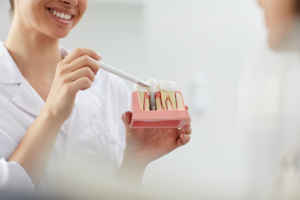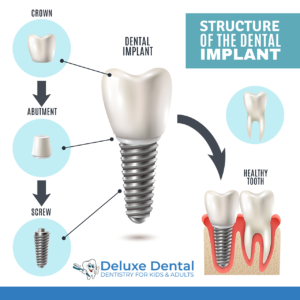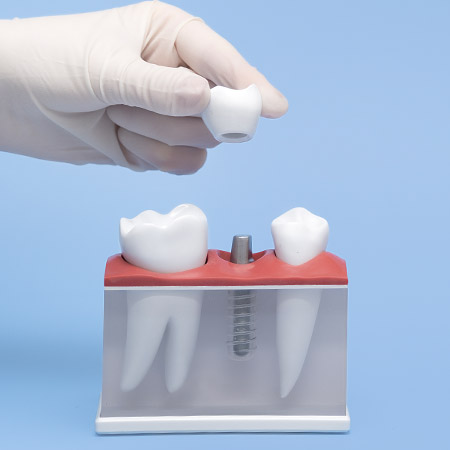 Dental Implants
Dental Implants
If you need to have one or more teeth extracted, you’ll be faced with making a decision about which replacement option makes the most sense for your individual situation. Aside from dental bridges or dentures, dental implants make an amazing treatment choice for a variety of reasons. At Deluxe Dental we value an educated customer. So let’s take a look at some important things to consider before you decide.
There is no denying the fact that nothing beats a natural tooth in terms of appearance and function. Alternatives like dentures and bridges are acceptable choices for many people, but they are not without flaws. Dental implants offer the closest replacement for both the function and aesthetics of natural teeth.
Dental Implant Benefits
- Permanent replacement solution
- Firmly anchored within the jawbone and cannot slip
- Offers the look, feel, and function of a natural tooth

What are dental implants?
Dental implants are a structure implanted within the jawbone itself to provide a firm foundation for chewing and biting. An implant consists of three parts: a metal post, an abutment and a dental crown.
Getting a dental implant requires multiple dental appointments. At the first visit, your dentist will implant a titanium metal post into your jawbone. The presence of this post stimulates the jaw into forming new bone and fusing to it for solid support.
At a subsequent appointment, you would return to have an abutment placed over the implanted metal post. Its purpose is to allow for the attachment of the final piece: a dental crown, which serves as a cosmetic and functional replacement for the chewing surface of a tooth. When seen from the outside, there is virtually no distinction between a dental implant and a natural tooth.

Four advantage of Implants
What about comfort?
Dental implants were created as a permanent solution for those with missing teeth. Dentures, in contrast, are made to be fitted over the gums. They can be removed on a regular basis. Even if dentures have an amazing fit and a good adhesive to minimize friction and retain them into place, many patients find them uncomfortable.
Dental implants can never slip within your mouth, like dentures sometimes can. This is because they are solidly anchored within the jawbone itself. They function as an immovable anchor for a replacement tooth that should last you for a lifetime. The result is a feeling of comfort when you bite, chew or speak. You should not experience any pain due to friction.
Maintain Bone Density
If you have a tooth pulled, the bone that once surrounded the tooth will start to melt away. Known as the process of resorption, this can result in a number of subsequent issues. Implants help to strengthen the area and prevent the loss of bone density that would otherwise occur. Another unpleasant aspect of bone loss due to a missing tooth is that the facial structure can begin collapsing inward, which results in a prematurely aged face with deep folds and wrinkles around the mouth area.
Prevents Shifting
Whenever you have a gap in your smile, the teeth on either side of the empty space can begin shifting into it, causing problems like a change in your bite. Implants prevent this from happening.
Increases Self-Confidence
There is a strong correlation between self-confidence and the practice of proper oral hygiene. When you are confident in your appearance, you’re more likely to take care of your health, including your teeth.Dental implants offer a significant mood boost for those who have felt self-conscious about their smiles because of one or more missing teeth. Whenever you receive something nice and new, you tend to want to take care of it. The same is definitely true of dental implants.
Dental Implant Procedure
Although there are some individual differences between patients, here is generally how a dental implant procedure unfolds:
Jawbone Preparation
This step is only needed for those who have inadequate bone mass in the area needing an implant. As mentioned earlier, the process of bone resorption leads to a loss of bone density when there is no tooth present in its socket. In this case, the patient would need a bone graft procedure to strengthen the area so that it can support a dental implant. Your dentist would implant some donor bone into the area that will eventually receive the dental implant. Over the following months, the bone will be integrated into the area to shore it up so that it can receive an eventual dental implant.
Naturally, if a bone graft is necessary, this will add to the time and expense needed for getting a dental implant.
For many patients, the first step in getting an implant does not involve a bone graft procedure. You will be provided with sedation, as well as local anesthesia before the implantation process. Your dentist should be able to place your dental implant in under one hour, in most cases.
The next step is known as osseointegration, which is when your implant will be fusing with the underlying bone. This can take several weeks to complete. Once this happens, you will have an abutment placed at a follow-up appointment. This allows for the connection of a dental crown to cap the entire structure.
Aftercare
Once you’ve received your new dental implant, no special care is needed. You would simply brush and floss the implant just as if it was a natural tooth. Continue brushing twice daily and flossing at least once a day to prevent gum disease, which could undermine all of your teeth, whether they are natural or not.
Schedule Your Free Consultation
If you’re looking for the best dental care, you will want the very best provider available. Well look no further! Contact the office of Dr. Kizy today to schedule your complimentary consultation.She and her Implant specialist team will be happy to give you a Deluxe Smile for years to come.

